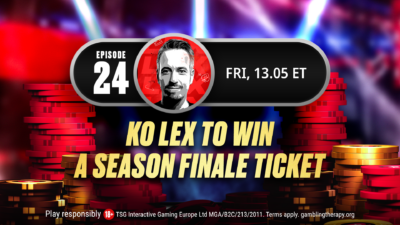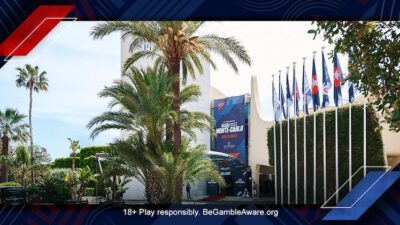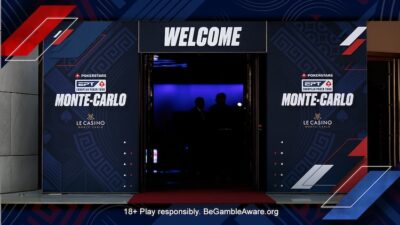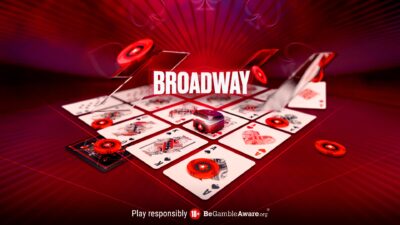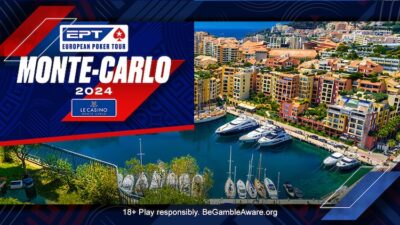Dr. Pauly
Make sure you take a peek at Wil’s piece called WSOP Main Event: Tom McEvoy – Exit Interview with a Champion.
Wil and I met up with Tom McEvoy about an hour he busted out. We spoke for almost an hour in the PokerStars suite and even had Bill Chen stop by and join the conversation.
When asked about the maniacs in the tournament with plenty of chips, McEvoy said, “Many many times people get a hold of chips because they played substandard hands and got lucky and kept doing it and bulldozed people along the way. If they don’t switch gears, they’ll have trouble. The deeper you get into a tournament, you run into more skillful players that have survived and lasted long.
“As far as playing the main event, I have some of the most experience. As far as I know, only two players have played in more consecutive events than I have. I have played every year since I won in 1983. Dewey Tomko and Berry Johnston are the only two who have an unbroken streak bigger than mine. I know that Doyle missed a couple of years. But I’d say I have the most experience. That gives me an edge. But playing against that many players in the main event, that experience become over rated. All I have to do is focus on my table and try to survive my table. One table at a time.


“I hate A-Q and I hate J-J. And I lost a bunch of chips with Jacks, most of my stack, when I ran into aces. I could have saved 50K, but I didn’t. I was forced to race with two 8s and I was taken out with A-J. You have to win coinflips. You play really well for three or four days and then all of a sudden all your money goes in with A-K versus a pair or similar to what I had. That’s both the beauty and frustration of the game. It’s the beauty because it encourages players to play, because they know about the luck factor and on any given day they can become the world champion. It’s also very frustrating because for better players. I try to play low ball poker, which is trying to play small pots. I avoided any all-in confrontations on Day 2 and on Day 3, I was all in when I had a top set of Aces and someone called with K-K on a flop of A-Q-J. On Day 2 and Day 3, people are going all in like crazy. I don’t go all in unless you have the nuts.
“I try to play small pots where I think I have a bigger edge. That’s where the experience comes in. Some people are afraid to play. They over bet the pot, or underbet the pot, or give a free card when they shouldn’t. Those are all mistakes where I capitalize on. I had a mantra that I kept telling myself the entire tournament, ‘Don’t make any mistakes.’ Guess what? I made one mistake today and lost over half my stack with Jacks. This game is very cruel and unforgiving.
“Andy Bloch said that ‘Poker is a godless game filled with random pain,'” said Wil.
Tom laughed.
“That’s a very good quote,” he said. “That I certainly agree with. Andy is a brilliant guy. Imagine what kind of pain Andy’s in after getting so close in the HORSE event after beating out the world’s toughest line up. He had Chip Reese all in how many times? And Chip comes back to win. That’s more than random pain. That’s a lot of pain. That’s brutal. Which reminds me of when TJ Cloutier lost to Ferguson (in 2001) at the river with 90% chips in the pot. TJ said he could just feel that 9 coming off. Everyone in the room was staring at Chris Ferguson. Everyone but one. I was looking at TJ. I knew that he may never get to the end like that again. It was his second time as runner-up and he took third one other time. I wanted to see if he could take it. TJ has his flaws, which are fairly well known. As far as being a man and taking it, that’s gotta be like taking a punch in the gut. TJ was the first man to stand up and shake Ferguson’s hand. And when they interviewed TJ afterwards, he said, ‘Obviously it feels terrible, but that’s poker.’ And you know inside he’s churning, but he was able to take it. The ESPN guys were wondering if I wanted to do the interview after I busted today. They weren’t too sure I’d want to do it. I told them I was alright and I’d do it.
“I noticed that comes with experience. It comes with a level of class,” WIl said. “I know some players who have no class at all, like one guy with ten bracelets.”
“We won’t mention his name,” said Tom. “But his initials are Phil Hellmuth.”
“I see young players who consider themselves pros. But they are under 25 and they have no class. they play a good game and have a lot of money, but they have no class,” Wil continued.
“I’d like to see where these guys are in ten years,” McEvoy said, “I’ve been a professional poker player since 1978. I can’t act like Hellmuth. I can’t berate my opponents. It’s not in me. You’re not going to see me jumping up and down celebrating. I only did it once, when I won the main event in 1983 after playing heads up for seven hours, which happens to be a record. I like to smack those guys who celebrate after they win a hand. They see how it’s done on television and they think it’s supposed to happen that way.”
“Like a college sporting event,” added two-time bracelet winner Bill Chen. “They are fist pumping and chest-bumping. That’s not poker.”
“How much of that is the fact that these kids are playing solely online and never in a casino. And back in the day, they take you outside to the parking lot,” I mentioned.
“Oh boy,” McEvoy said as he shook his head. “They used to do that when I started playing. You’d get your ass kicked if you acted up.”
“The kids are following examples from the pros,” Bill Chen said. “We won’t mention any names. But certain pros do that on TV during final tables and they think it’s acceptable.”
“Do you think that getting an edge in these huge fields is based both on your experience as a pro and playing against large fields in tournaments on PokerStars?” I asked.
“I have another extra edge over pros because I’ve been affiliated with PokerStars for almost four years,” said McEvoy. “Way before Moneymaker and Raymer and Hachem. I’ve played extensively in tournaments. I play virtually but NL tournaments, and sometimes PLO. I got tons of internet experience. So I feel that I can perform better against internet players because I really study them when they come to the WSOP. They are not throwing me as many curveballs. I’ve seen it all. I know how to play internet players because I ‘r’ one. I live in Las Vegas and I virtually never go to the casinos to play in cash games. I play at home all the time. I make sure I play a lot on the site. I like playing, sometimes two or three games at once.”
“What was the biggest mistake you saw players making in the main event?”
“Besides buying in?” joked Bill Chen.
“I saw some unusual plays, that I would never make. Like the guy who pushed all in against me with K-K with an Ace on the board and I was holding two Aces. What kind of play is that? What are they think?”
“Is it the online influence?”
“It must be. Playing online they are used to doing that. They can be right some of the time, but here against the world’s best players, that’s a lot of chips to jeopardize in a situation like that.”
McEvoy told us about how the Horseshoe was so small that they used other casinos to host the extra tables. The players would joke that they were trying to make it to the “final casino.”
Wil and I had to get back to the floor to cover the remainder of the Main Event, otherwise we would have sat and chatted with Tom McEvoy for several more hours. He suggested that there has been interest in a non-strategy book about his numerous poker stories. I hope he’ll write that one day.
Back to Top

